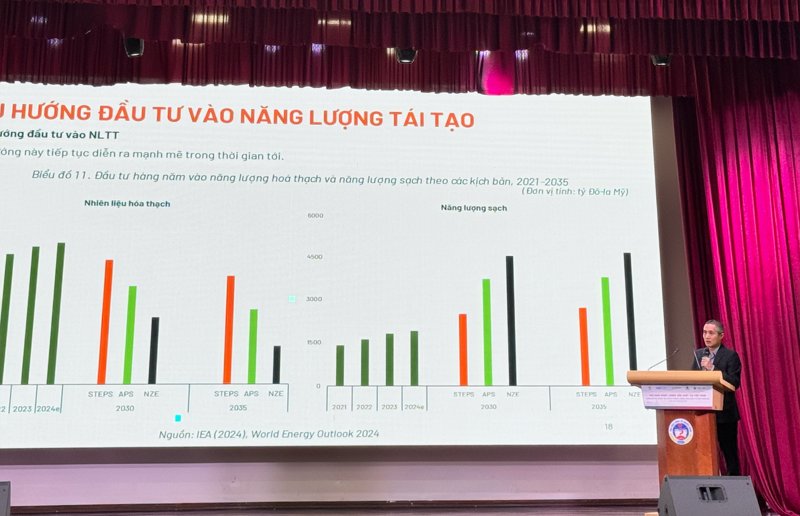The "Made in Vietnam Energy" dialogue was co-organized in Hanoi on June 18 by the National Economics University (NEU) and the Power and Energy Working Group (PEWG), as part of the Vietnam Business Forum (VBF) 2025.
At the dialogue, experts emphasized that to realize the country’s renewable energy development goals, Vietnam must implement synchronized and effective solutions to attract investment capital, not only from domestic sources but also from foreign investors.
Accordingly, both the National Energy Development Strategy to 2030 with a Vision to 2045 and the revised Power Development Plan VIII (PDP8) clearly demonstrate a strategic direction for accelerating the development of renewable energy, gradually reducing dependence on fossil fuels, and aiming for the goal of net-zero emissions by 2050.
To realize these ambitious goals, Ms. Do Hong Thanh, Deputy Director of Power Market Development Research and Training Center at the Ministry of Industry and Trade (MoIT), stated that a key prerequisite is the mobilization of substantial investment resources, especially from the private sector and international investors.
According to the Central Institute for Economic Management (CIEM), if Vietnam raises public and private investment in renewable energy to around 5 per cent of total social investment, the country’s GDP could increase by 0.7 per cent to 1.1 per cent annually compared to a scenario without investment in renewable energy.
Similarly, a McKinsey & Company analysis indicates that if Vietnam maintains an average annual investment of $15 billion in renewable energy between 2025 and 2040, the country's GDP in 2040 could be 6 per cent to 10 per cent higher than the scenario without investment in renewable energy.
Based on these projections, Prof. Dr. Dinh Duc Truong, Dean of the Faculty of Environment, Climate Change, and Urban Studies at NEU, emphasized that boosting investment in renewable energy not only promotes GDP growth but also contributes to transitioning the economic growth model toward sustainability.
However, Vietnam still faces many barriers to attracting investment from both domestic and foreign investors in renewable energy.
According to Dr. Dinh Tuan Minh, Director of the Market-based Solutions Center for Social and Economic Issues, one of the major obstacles is that the current legal and policy framework lacks consistency, stability, and transparency. Besides, complex administrative procedures, underdeveloped technical infrastructure, and a limited domestic capital market are diminishing Vietnam’s appeal to investors.
Therefore, Dr. Minh suggested that Vietnam should develop specific solutions to improve the investment environment, especially to attract large-scale, long-term capital from foreign investors when many domestic enterprises still face difficulties in accessing large-scale and long-term financing for renewable energy projects:
Firstly, a stable and transparent legal framework must be finalized promptly to unlock FDI into renewable energy.
Secondly, it is crucial to invest in upgrading technical infrastructure, especially the national power transmission system. It is because the current system is not keeping pace with the rapid growth of renewable energy capacity, leading to local grid overloads and resource wastage.
Thirdly, Vietnam should promote high-quality FDI through practical incentive mechanisms. In which, priority should be given to investors with strong financial capacity and advanced technology. Additionally, technology transfer should be encouraged, and public-private dialogue should be enhanced to build long-term investor trust.
Fourthly, developing supporting industries and enhancing domestic capacity are also key to boosting the renewable energy sector.
Regarding international perspective, Ms. Sunita Dubey, Country Representative of Global Energy Alliance for People and Planet in Vietnam, emphasized that the development of renewable energy in Vietnam also requires coordinated action, from building clear and reliable policies to attract investors to developing innovative financial instruments to mobilize large-scale green finance.
“Specially, Vietnam needs to strengthen institutional cooperation between ministries, regulatory bodies, and both domestic and international financial institutions to attract investment capital into renewable energy in the coming period,” Ms. Dubey emphasized.









 Google translate
Google translate